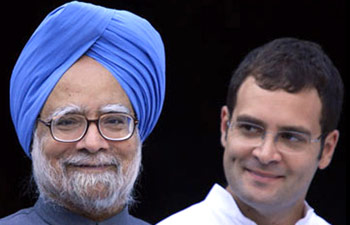New Delhi, Oct 2: After his public outburst against ordinance, Congress Vice President Rahul Gandhi today met Prime Minister Manmohan Singh and is understood to have explained his reasons for opposing the move that will protect convicted lawmakers from immediate disqualification.
Sources said Rahul met Singh at his residence here and the meeting between the two lasted 30 minutes.
Rahul is understood to have told Singh about the reasons for his reservations over the ordinance.
The meeting came a day after Singh returned from his US visit and said he would try to find out the reason why Rahul made a public statement and "why it had to be done that way".
Rahul had earlier this week said at a press conference that the ordinance is "complete nonsense" and should be "torn up and thrown away".
Making it clear that he was not undermining Singh's authority in any way, the Congress Vice President had the same day written a letter to the Prime Minister, saying that he has the "greatest admiration" for his leadership in extremely difficult circumstances.
Many saw Rahul's outburst on the ordinance as an embarrassment for the Prime Minister and the Opposition vociferously demanded that Singh, who was on a visit to the US at the time, should step down after his return. On his way back, Singh had ruled out his resignation.
The sources said the government is mulling whether to withdraw the ordinance- which was sent to President Pranab Mukherjee after the Cabinet had cleared it- or ask the President to exercise his pocket veto and sit over it.
The Prime Minister has convened a meeting of the Cabinet this evening after he calls on the President to discuss the issue.
The President is said to have reservations over the move to provide immunity to MPs and MLAs from immediate disqualification overriding a Supreme Court judgement on the issue.
A meeting of the Congress Core Group that includes party chief Sonia Gandhi, the Prime Minister and top ministers was held to discuss the issue.





Comments
Add new comment